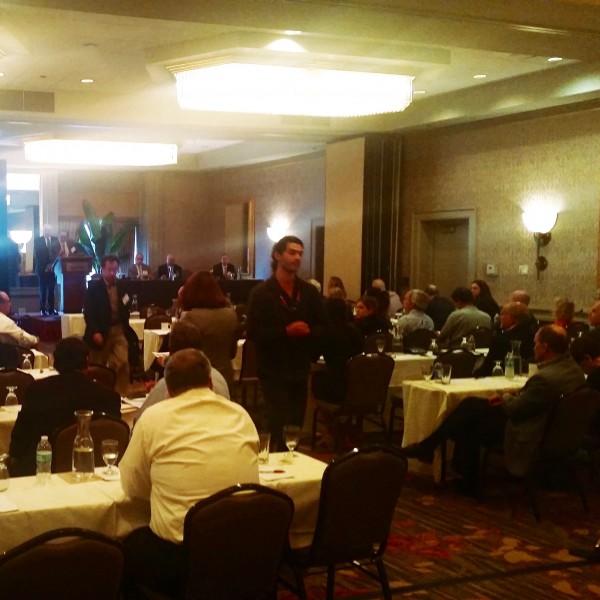 The Consumer Liaison Group (CLG) Meeting happens four times a year and its a chance for ISO-NE to exchange information with electricity consumers in New England. ISO-NE is the group that regulates our electricity markets and keeps the lights on by coordinating electricity generation and transmission. They run billion dollar markets and interact with companies like Spectra Energy, Invenergy, National Grid and Deepwater Wind. Pretty much every aspect of the process of getting electricity to your television is touched upon by ISO-NE in some way.
The Consumer Liaison Group (CLG) Meeting happens four times a year and its a chance for ISO-NE to exchange information with electricity consumers in New England. ISO-NE is the group that regulates our electricity markets and keeps the lights on by coordinating electricity generation and transmission. They run billion dollar markets and interact with companies like Spectra Energy, Invenergy, National Grid and Deepwater Wind. Pretty much every aspect of the process of getting electricity to your television is touched upon by ISO-NE in some way.
 The latest meeting of the CLG, in Providence on Thursday, featured a panel discussion with representatives from the four companies mentioned above. The panel was pulled together with the help of Douglas Gablinske, executive director of The Energy Council of Rhode Island (TEC-RI) an advocacy group for energy company concerns. Readers of RI Future may remember that Gablinske was a vocal opponent of Cale Keable’s bill to reform the Energy Facilities Siting Board (EFSB). He was also the only speaker at the RI Public Utilities Commission (RIPUC) to speak in favor of the pipeline tariff.
The latest meeting of the CLG, in Providence on Thursday, featured a panel discussion with representatives from the four companies mentioned above. The panel was pulled together with the help of Douglas Gablinske, executive director of The Energy Council of Rhode Island (TEC-RI) an advocacy group for energy company concerns. Readers of RI Future may remember that Gablinske was a vocal opponent of Cale Keable’s bill to reform the Energy Facilities Siting Board (EFSB). He was also the only speaker at the RI Public Utilities Commission (RIPUC) to speak in favor of the pipeline tariff.
Gablinske surprised me by asking if I knew about any planned protests or disruptions. I said I didn’t. He asked me specifically about the FANG Collective. I had no idea of what plans they have, if any, I said. Then Gablinske said that he noticed Mary Pendergast on the list of people who had signed up to attend. Pendergast was sitting in the room, and he soon went over to introduce himself to her.
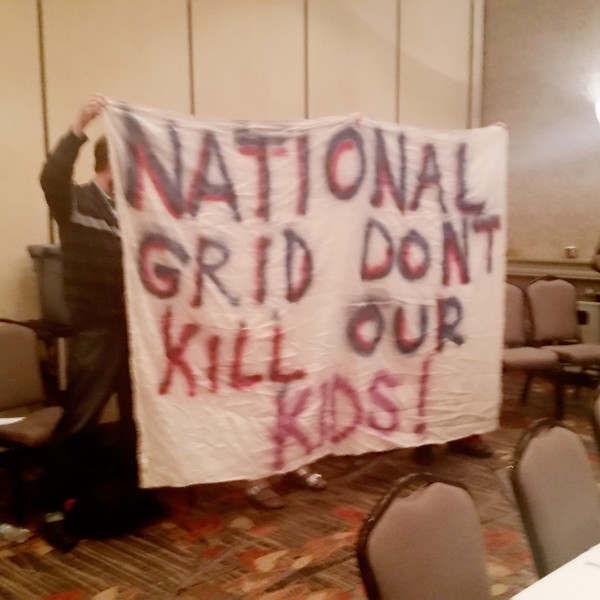
During the course of the presentation there was a disruption. As Invenergy’s John Niland gave his presentation to the room, Mary Pendergast stood and display a small sign that said, “No fracked gas Power plant.” Her protest was silent but it did seem to throw Niland off a bit, as his delivery seemed somewhat distracted.
It was during the third presentation that the disruptions became more pronounced. As Richard Kruse, vice president at Spectra Energy spoke glowingly about the need for bigger and better pipelines in our fracked gas infrastructure future, Kathy Martley of BASE (Burrillville Against Spectra Expansion), Keith Clougherty of the FANG Collective and Sally Mendzela stood up.
“Spectra Energy, Energy for Death,” said Martley as I headed for my camera. “Say no to Invenergy and tell Invenergy to go home,” Martley continued.
As the protest continued, Gablinske took the podium and said, “You have a right to be here but not be disruptive” as Clougherty continued to speak.
Lennette Boiselle, an ally of Geblinske and a lobbyist for the Northern Rhode Island Chamber of Commerce got up and left the room, presumably in search of security. Readers might remember Boiselle as the person arguing against democracy at the public comment hearing concerning Cale Keable’s EFSB bill.
“The political correctness, of not allowing other people to talk is sweeping through this country,” said Geblinske, “It’s an incorrect assumption, this gentlemen has the right to speak…”
“We’ve been listening to you our whole lives, Pal,” interrupted Sally Mendzela.
Gablinske ultimately offered to set up a forum where “both sides” could be heard but it is unknown if this will actually happen. The protesters took their seats, no one was ejected from the forum, and Kruse finished his talk.
Amazingly, though, that wasn’t the end. During a brief question and answer period at the end of the presentations, Gablinske called on Clougherty to ask a question!
“I would ask for a question, not a speech or a statement,” said Gablinske, when he realized who he had called upon.
Clougherty then asked Niland, Kruse and Bill Malee, a National Grid VP, “Do your companies have any money set aside for restitution for the millions of people who are going to be displaced and killed by the infrastructure projects you all are proposing?”
There is no good answer representatives from these companies can give, yet Niland attempted one. As expected, it was not good.
I found the most interesting talk of the day came from Mary Louise “Weezie” Nuara, External Affairs Representative for ISO-NE.
“The region’s competitive wholesale electricity markets are really designed to maintain reliability through the selection of the most economically efficient set of resources,” said Nuara, but the states “have environmental and renewable energy goals that are beyond the objectives of the wholesale electricity markets.”
What’s happening is that states are setting goals to increase renewables and reduce greenhouse gas emissions (like the goals set out in ResilientRI, but all the New England states have some version of this idea.) ISO-NE is designed to deliver energy as reliably and cheaply as possible. As a market, it cannot deliver renewables or reduce emissions unless those options are cheaper and cleaner. In August, NEPOOL (which represents the interest of the New England states when dealing with ISO-NE) began looking into how to adjust wholesale electricity markets to accommodate the goals of the states. It is NEPOOL’s goal to develop a “framework document” by December 2 to provide guidance to ISO-NE regarding potential changes. (A kind of advisory opinion, if you will.)
What makes this interesting, to my mind, is that if ISO-NE starts taking the climate change concerns of the states into account, plants like the one Invenergy is planning for Burrillville will have a harder time selling their energy into the markets.
ISO-NE is a little over a decade old, but already it’s finding that its systems are in need of being updated over concerns of climate change. By contrast, the EFSB here in Rhode Island was established thirty years ago, in 1986. The RI General Assembly has shown little inclination towards revising the EFSB’s mandate in lieu of climate change.
Below please find all the video from the CLg meeting except for the closing comments.
Rebecca Tepper, chair of the CLG Coordinating Committee and chief of the Energy & Telecommunications Division of the Massachusetts Attorney General’s office introduced keynote speaker Rhode Island General Treasurer Seth Magaziner.
Douglas Gablinske, executive director, The Energy Council of Rhode Island
Jeffrey Grybowski, chief executive officer, Deepwater Wind
John Niland, director of business development, Invenergy
Richard Kruse, vice president and regulatory & FERC compliance officer for Spectra Energy
Bill Malee, vice president of regulatory affairs, for National Grid
ISO-NE Q&A
]]>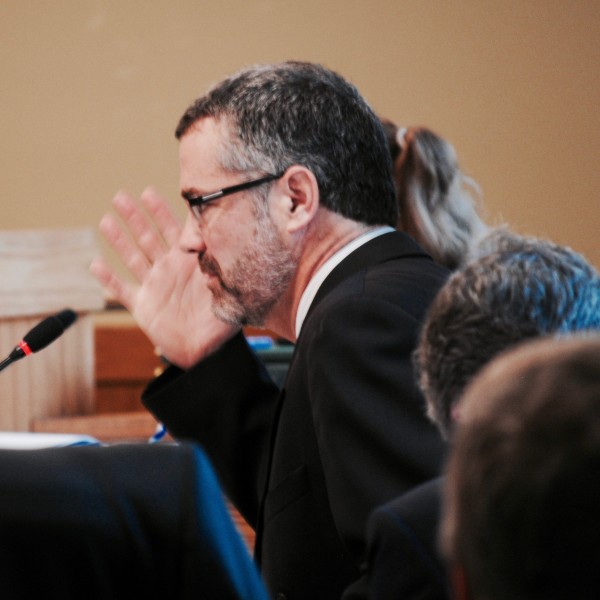
On the second day of the RI Public Utilities Commission (RIPUC)’s evidentiary hearing concerning Invenergy‘s proposed $700 million fracked gas and diesel oil burning power plant, to be located in Burrillville, Jerry Elmer of the Conservation Law Foundation (CLF) presented his witnesses who argued that the power plant is not needed and that it’s effect on ratepayers would be negligible.
The CLF’s case is one of nuance, and much depends on the views of Commissioner Herbert DeSimone Jr. DeSimone is the one commissioner on the PUC board that did not recuse themself, and the one commissioner who will write the RIPUC’s advisory opinion to the Energy Facilities Siting Board (EFSB), the body ultimately responsible for deciding on the plant. Invenergy is making the case that since the proposed plant has already sold half its capacity in an energy futures market run by ISO-NE, the plant is by definition needed. This is the default position not only of Invenergy, but also of the RI Office of Energy Resources (OER) and the RIPUC, if the questioning from their attorneys at the hearing are any indication.

The CLF is maintaining that what ISO-NE did was purchase extra power, and if Invenergy’s plant is taken out, there will still be more than enough electricity on the grid to power all of New England. Also, going forward, as more and more renewables come on line, the need for the plant will go down, not increase. Unfortunately, ISO-NE is somewhat of a black box. Though they publish thousands of pages on how their energy auctions are run, figuring out why one plant’s energy was purchased and another was not is virtually impossible, and no one from ISO-NE was at the hearing to answer questions.
As for ratepayer savings, on the first day of the hearing Invenergy’s attorney Alan Shoer called his witnesses and made his case that the savings to ratepayers would be significant. On the stand, John Niland, director of development for Invenergy admitted that the $280 million number he gave to Burrillville residents earlier in the year was false, and that he knew it was false when he presented it. The true number was closer to $36 million in rate payer savings.
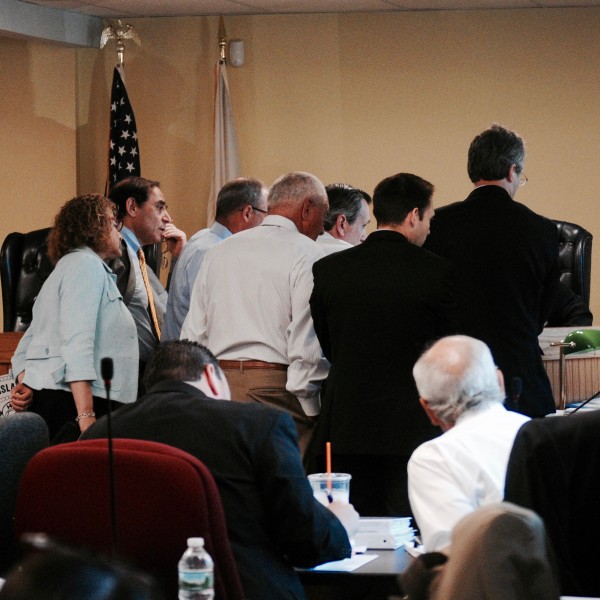
The CLF’s witness, Christopher Stix, also ruled out the $280 million number, saying it took him one week after the ISO-NE auction results were published to perform his calculations that the actual savings ranged from between zero and $36 million. John Niland testified that Invenergy did not know this number when he falsely gave the $280 million figure to the audience in Burrillville seven weeks after the auction published its results.
It is up to DeSimone to decide whether or not a savings of between zero and $36 million to rate payers is worth the additional pollution, the despoilment of Burrillville’s pristine habitats and the continued dependency on fracked gas for our energy needs in New England for decades to come. It is worth noting that $280 million was a number too big to ignore, from an economic standpoint, where as zero to $36 million (which is a bell curve, the actual number may be closer to $20 million) is not nearly as tantalizing.
The CLF’s first witness, Robert Fagan, testified for a marathon five hours.
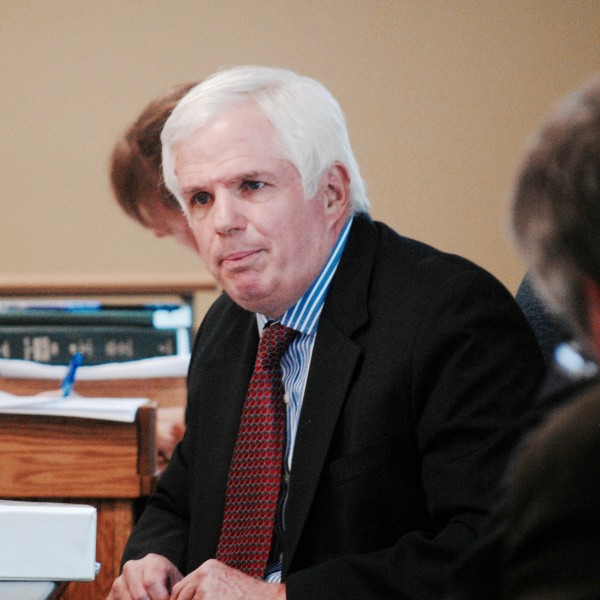
“We know now is that the Invenergy plant is not needed for electrical needs in New England,” said Fagan, and under cross examination he did not falter.
Getting through Fagan’s testimony required defining a host of terms and acronyms. ICR, LOLE, NERC, sloping versus vertical demand curves etc. were defined and discussed. It was very technical, but it served two functions. One, it established Fagan’s expertise, something Invenergy tried to call into question in pre-filed testimony, and two, it helped prove Fagan’s case that the proposed power plant was not necessary.
Though high-powered attorneys Alan Shoer and Jerry Elmer set the tone for the meeting, it’s most likely that RIPUC attorney Cynthia Wilson-Frias will have the most impact on Commissioner DeSimone’s advisory opinion, given that she will likely help author it and DeSimone can be expected to lean heavily on RIPUC’s in house legal expertise. Wilson-Frias asked pointed questions about the fact that Invenergy already sold some of its expected output to ISO-NE. She indicated that since the energy sold, it is by definition needed. Fagan countered this logic well, his entire testimony was in fact a rebuttal of sorts to this idea, so it comes down to how much weight Wilson-Frias gives Fagan’s views versus the more mainstream “free” market ideas favored by Invenergy.
The last day of the hearing is today, and unfortunately I will not be in attendance. I hope to get an update from Jerry Elmer after the hearing.
You can view the entire days proceedings below:
]]>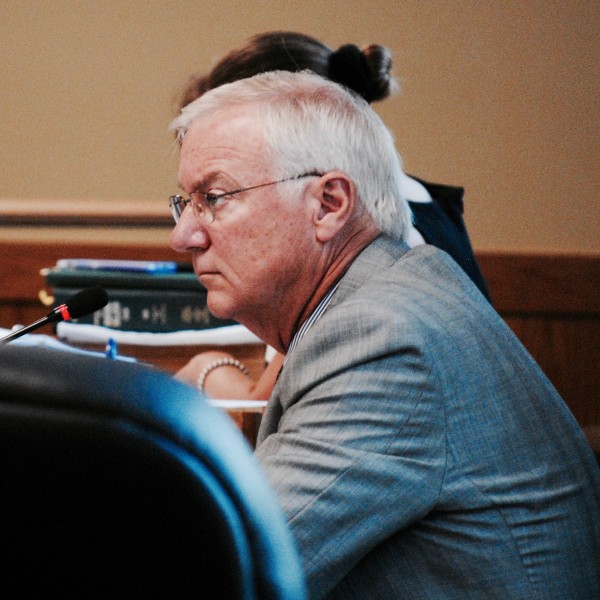
There were two big reveals at the first day of the PUC evidentiary hearing in Warwick on Monday. First, John Niland, director of development for Invenergy, admitted under oath that he knowingly gave false information to the EFSB at the March 31, 2016 EFSB hearing held at the Burrillville High School. Second, Invenergy’s proposed plant will not be clean: It’s emissions will be higher than the the current New England average of all power plants.
Everyone seemed surprised that the evidentiary hearing at the Public Utilities Commission (PUC) regarding Invenergy’s proposed $700 million fracked gas and diesel oil burning power plant for the Town of Burrillville wasn’t packed with Burrillville residents. The Warwick police officer seated at the back of the room looked almost bored. Michael McElroy rescinded his motion to hold the hearing in a larger venue because, as his co-counsel Oleg Nikolyszyn said, “there are plenty of seats.” Of course, holding the meeting 40 minutes outside Burrillville during a work day was a surefire way to limit attendance.
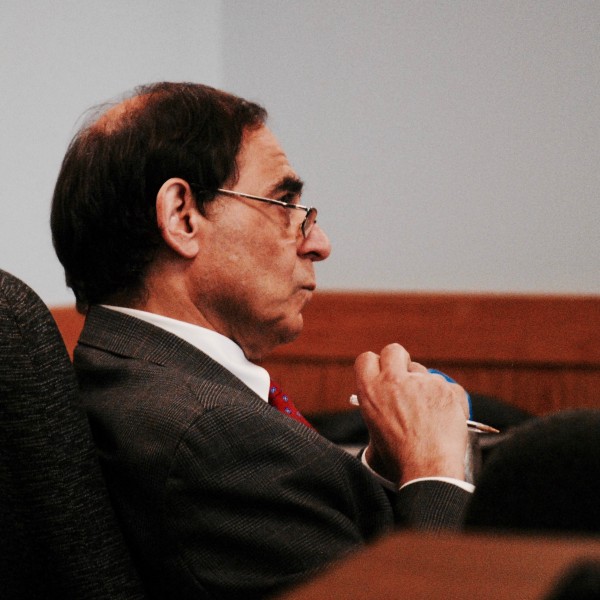
The Public Utilities Commission hearing is being held to help the one PUC commissioner that did not recuse himself craft an opinion on whether or not the plant is needed and what effects the plant will have on ratepayers. The one commissioner is lawyer Herbert F. DeSimone, Jr.. Of his co-commissioners, Margaret Curran is on the Energy Facilities Siting Board (EFSB), the body ultimately deciding on Invenergy’s application. Obviously she cannot write an advisory opinion to herself. Marion Gold is on record for having supported the plant during her stint as the executive director of the RI Office of Energy Resources. This leaves only Herbert DeSimone on the board. He will author the advisory opinion to the EFSB.
For what it’s worth DeSimone ruled early on that having only one person on the board does not violate any rules, as he will not be making any decisions, but will simply be crafting an advisory opinion.
Lawyers Alan Shoer, representing Invenergy and Jerry Elmer, representing the Conservation Law Foundation (CLF), delivered opening statements. Shoer argued that the plant is needed, that it will reduce air emissions and save ratepayers money. Elmer explained that Invenergy’s promises were unlikely.
The first witness was Building Trades president Michael Sabitoni. He testified on the “socio-economic impacts of project” i.e., the jobs. Elmer objected, because jobs are not within the scope of this hearing. DeSimone overruled Elmer, saying, “I’ll allow the statement to stand but I’ll give it the weight that is appropriate.”
Under grilling from Burrilville’s lawyer Michael McElroy, Sabitoni estimated that 80 percent of the jobs created by this project will be from Rhode Island. He had no estimates on the number of jobs that will be created for Burrillville. He said that the members of his unions will be well placed to get the more permanent jobs on offer at the plant as well.
Next up was John Niland, director of development at Invenergy. His testimony stretched out for over 80 minutes, and there were some interesting exchanges along the way.
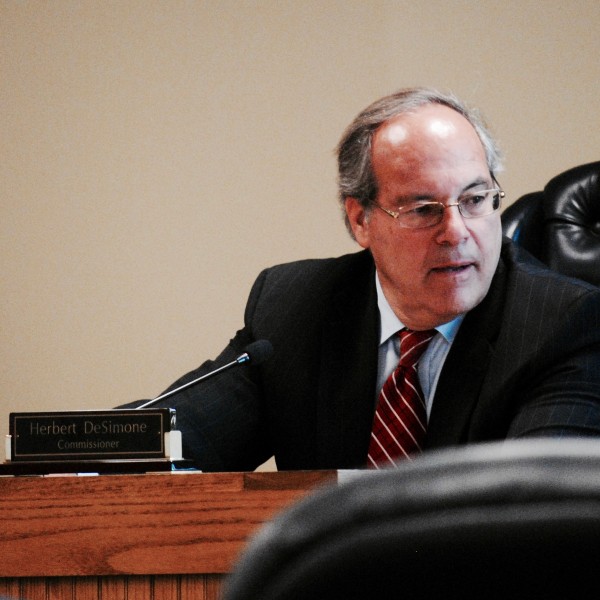
Under oath and under the examination of Jerry Elmer, Niland admitted that when he said, to the EFSB on March 31 in Burrillville, that Rhode Islanders would save $280 million on electricity after the new plant was built, he knew the number was wrong. He said that he didn’t have a better number to give, so he went with the older, wrong number. The true savings cannot be over $30 million, and could be closer to zero, maintains the CLF.
Under examination, Jerry Elmer also forced Niland to concede that Invenergy’s claim that coal and oil together account for 28 percent of New England’s energy footprint is incorrect. The true number is closer to six percent.
Niland claimed that since Invenergy sold half it’s output in the most recent energy auction, the plant is needed, by definition. Burrillville’s lawyer Michael McElroy pointed out that if only half the proposed plant’s energy is sold, then by Niland’s own logic only half the plant is needed. And if half the plant is all that’s needed, savings to ratepayers can be expected to be “substantially less.”
Niland ageed.
The growth of renewable energy sources will reduce the need for the power plant over time, said Niland. The plant has a life expectancy of 40 years. Niland knows of LNG plants still operating after 60 years. Niland admitted that Rhode Island’s dependency on fossil fuels will increase once the plant is built. If the plant is built, Rhode Island’s carbon footprint will go up, admitted Niland. Though technically, said Niland, given that RI is a net energy importer our emissions, “could be reduced.”
McElroy was not happy with Niland’s caveat. Within Rhode Island’s borders, asked McElroy, “Emissions will go up, correct?”
“I believe so,” said Niland.
McElroy asked about why Burrillville was chosen as a location for the plant. Niland said that the location was chosen due to its proximity to the Algonquin gas pipeline and electrical transmission wires. (Both of which were updated recently, I should note.) Niland’s job is to locate and develop projects like the one planned for Burrillville. He was initially lured here because of the state’s high energy prices, near $17 a killowatt hour. The new lower prices at the recent energy auction, closer to $7, will probably reduce interest in bringing large projects like this to the region, said Niland. If an energy plant doesn’t clear the energy auction, said Niland, it isn’t needed.
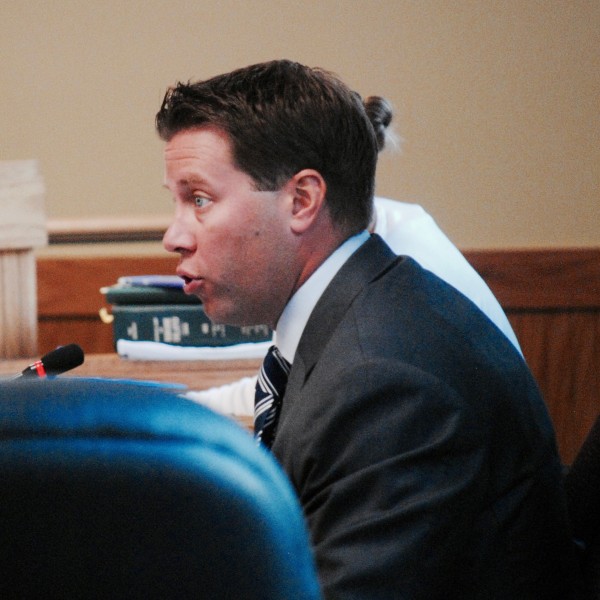
The next and last witness for Invenergy was Ryan Hardy. Hardy is the person who prepared Invenergy’s report that calculated the rate savings should the plant be built. Jerry Elmer began his cross examination by handing Hardy a calculator and asking him to run the numbers, based on Invenergy’s own specs. After a long pause, Hardy came up with the plant producing 817 pounds of CO2 per megawatt hour. Hardy’s written testimony was 760 pounds. Ryan countered that he was basing his number on estimates of actual plant use, which he estimated to be about 70 percent of capacity. The numbers Elmer had him calculate were maximum possible output.
Also, said Hardy, the plant will be “primarily run on LNG, never on fuel oil, unless gas is not available.”
However, both of Hardy’s estimates are over the New England average, meaning that the plant can’t reduce emissions, because the plant’s emissions are higher than the average plant emissions in New England.
Elmer asked Hardy about ratepayer savings next. “Was your analysis of FCA-10 [the electricity auction] based on selling both turbines?”
“Yes,” said Hardy.
“Were you wrong about that?”
“Yes.”
“Was it reasonable for Niland to estimate savings of $280 million when he knew otherwise?”
“Yes,” said Ryan.
You can read Jerry Elmer’s thoughts about day one of the hearing here.

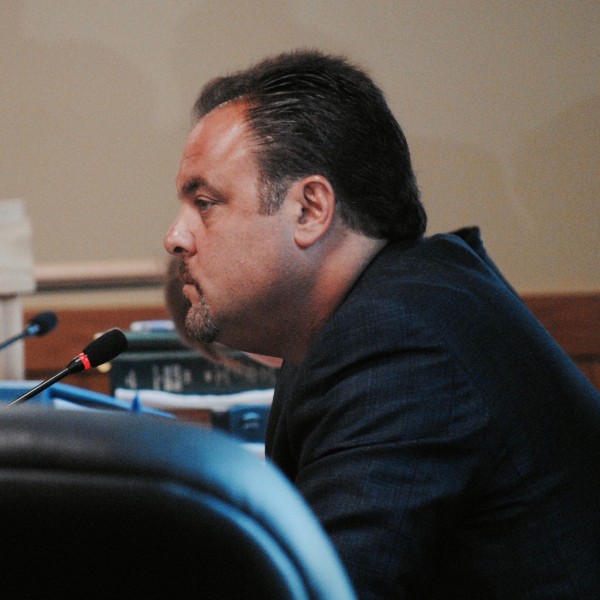
Further reading:
- Burrillville Town Council claims to be powerless against Spectra, Invenergy
- Burrillville Town Council argues with, disappoints residents on gas expansion project
- Power plant already adversely affecting Burrillville property values say realtors
- Burrillville state reps in the hot seat over Invenergy power plant
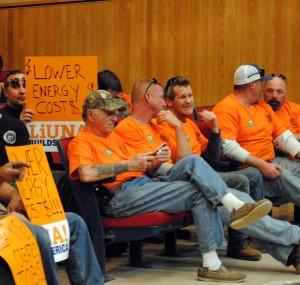
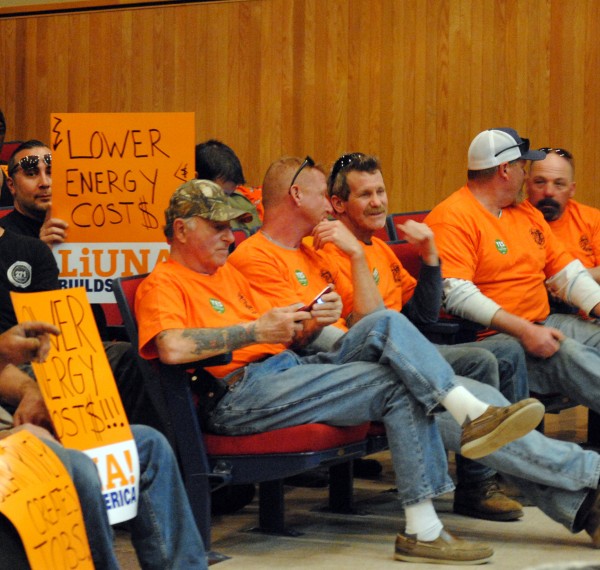 For full video of all public commentary, see here.
For full video of all public commentary, see here.
It has been a long wait, but the people of Burrillville finally got their chance to speak out on the Clear River Energy Center (CREC), Invenergy’s proposed $700 million gas and oil burning electrical plant last night. The Energy Facility Siting Board (EFSB) held the first public comment hearing in the Burrillville High School auditorium, which holds 600 people. More than 100 people were outside, unable to get in. Hundreds of people signed up to speak, only 48 people got to do so.
The EFSB board is made up of Margaret Curran, chair of the RI Public Utilities Commission and Janet Coit, director of the Department of Environmental Management. The third seat on the board has recently been filled, since Parag Agrawal has been hired as the associate director of the Rhode Island Division of Planning. He begins his new job on April 18, so should be at the next EFSB hearing.
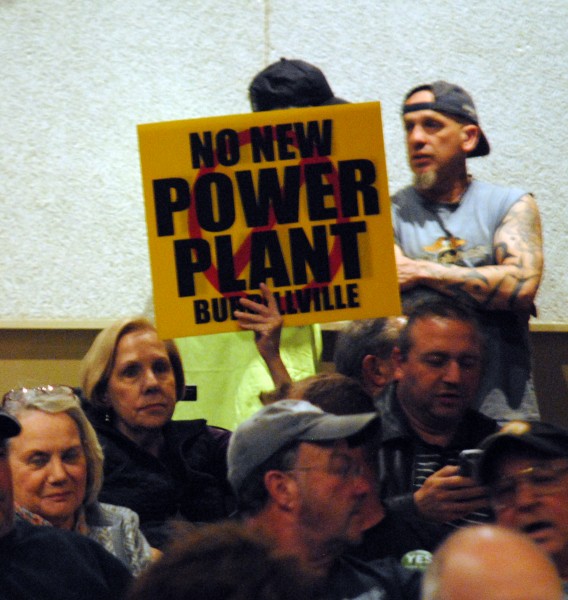 Tensions were high in the auditorium. Michael Sabitoni, president of the Rhode Island Building and Construction Trades Council and over a hundred union members arrived early, and many Burrillville natives resented their presence. One speaker from Burrillville claimed that the union members were “intimidating.” A union speaker objected to this, calling the accusation of intimidation, “B.S.”
Tensions were high in the auditorium. Michael Sabitoni, president of the Rhode Island Building and Construction Trades Council and over a hundred union members arrived early, and many Burrillville natives resented their presence. One speaker from Burrillville claimed that the union members were “intimidating.” A union speaker objected to this, calling the accusation of intimidation, “B.S.”
As near as I can tell, the eight speakers in favor of the power plant were all union members. They made their case based on the 300 construction and 24 permanent jobs that would be created. Sabitoni said that he’s run into meetings like this before, where a community shows up to complain about a large project to be built in their town. He dismissed the concerns of Burrillville citizens as NIMBYism.
Donna Woods was the first speaker, and she was set the tone for the evening. She said that there is a fear that the decision to approve the power plant has already been made, despite Curran and Coit’s insistence to the contrary. During Wood’s testimony, Curran broke protocol and addressed Wood directly, insisting that no decision has been made.
“Many of us feel that we’ve been screaming underwater,” said Woods, “This is real life stuff and we’re really afraid.”
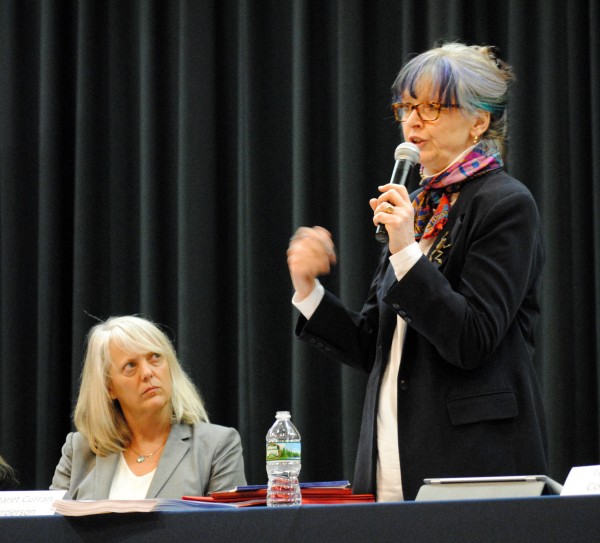
Residents of Burrillville and the surrounding communities are worried about the noise, air pollution, water pollution, the destruction of a pristine environment to make room for the power plant and their property values, which are already dropping. But many speakers spoke of the environmental dangers of fracking, about helping to prevent global warming and sea level rise, and about our greater duty to future generations.
Burrillville has experienced environmental disaster first hand. Well water was contaminated years ago with MBTE from a leaking gas station gas tank. MBTE causes cancer, and many in the auditorium last night have friends and relatives who suffered and died. Between the gas pipeline compressor stations, the Ocean State Power Plant and the MBTE disaster, many residents feel, in the words of one speaker, that, “Burrillville has given enough.”
Invenergy began the public comment hearing with a presentation. I wrote about this 30-60 minute long presentation and questioned the need for it here. Curran introduced the presentation saying it would last 20 minutes, but in fact it lasted longer, much closer to the originally estimated 30 minutes. After cutting the presentation short for time, Curran said that the full report was on the EFSB website, which is a point I made in my piece. An additional six members of the public could have spoken had Invenergy not been needlessly granted that time.
The frustration that the citizens of Burrillville feel about the proposed Invenergy power plant and the EFSB process is only expected to magnify over the next weeks and months. Frustration with their elected leaders in the Town Council, General Assembly and state wide offices is widespread and no one should be surprised if Burrillville seeks change in the upcoming elections.
The next public comment meeting is scheduled for 6pm, Monday, May 23.
- Full video of the EFSB hearing can be seen here
- Burrillville Town Council claims to be powerless against Spectra, Invenergy
- Burrillville Town Council argues with, disappoints residents on gas expansion project
- Power plant already adversely affecting Burrillville property values say realtors
- Burrillville state reps in the hot seat over Invenergy power plant
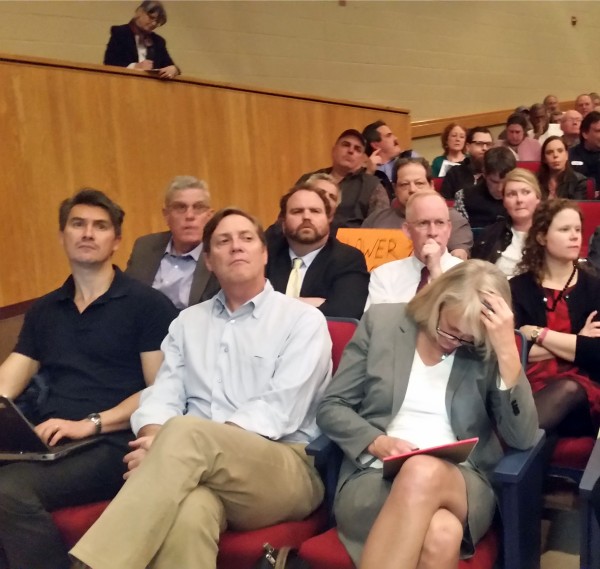
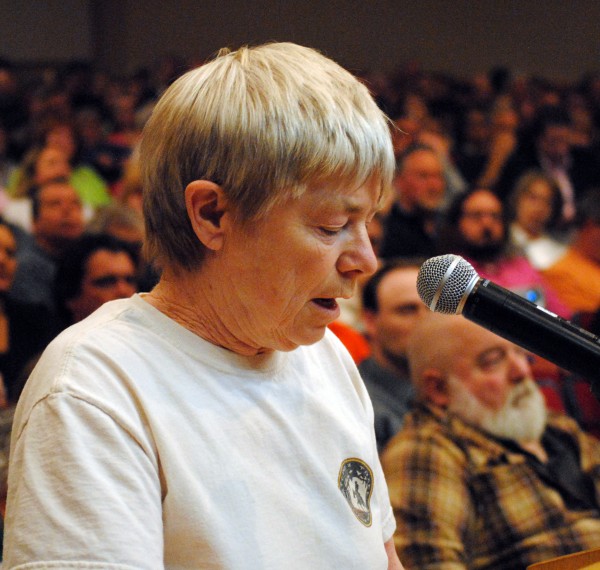
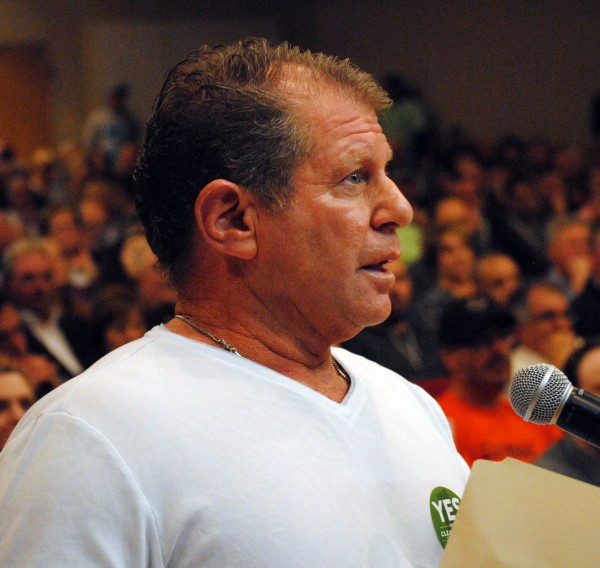
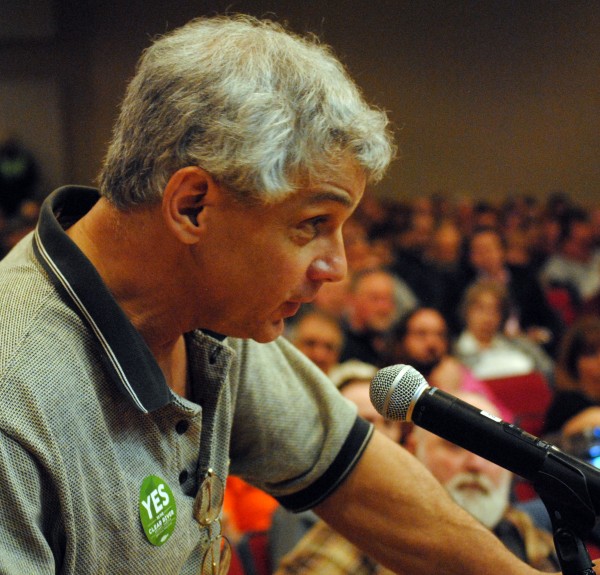
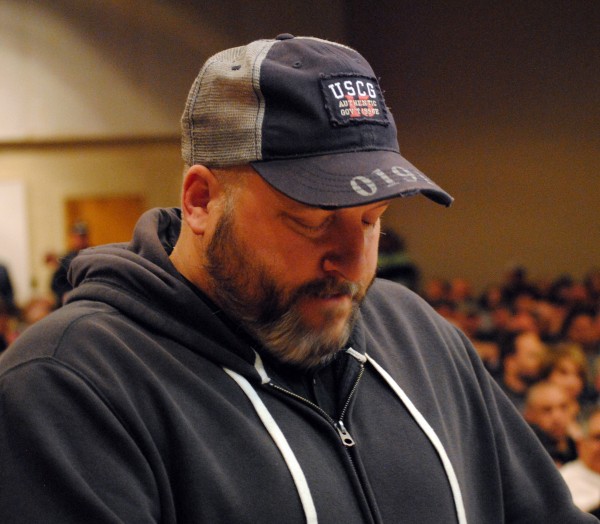
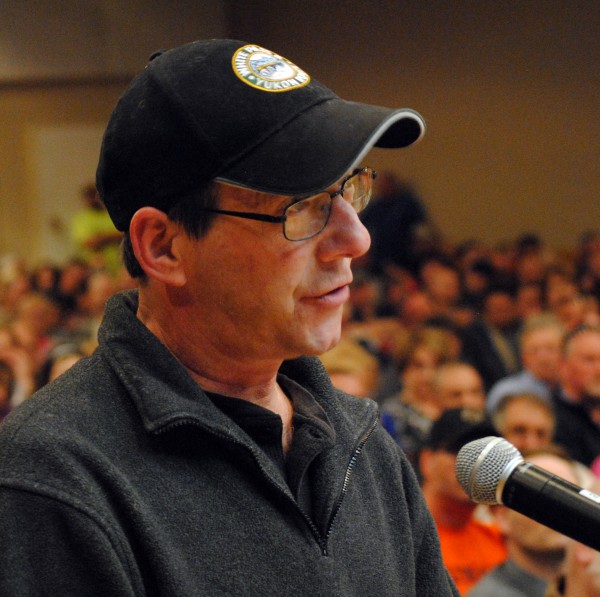
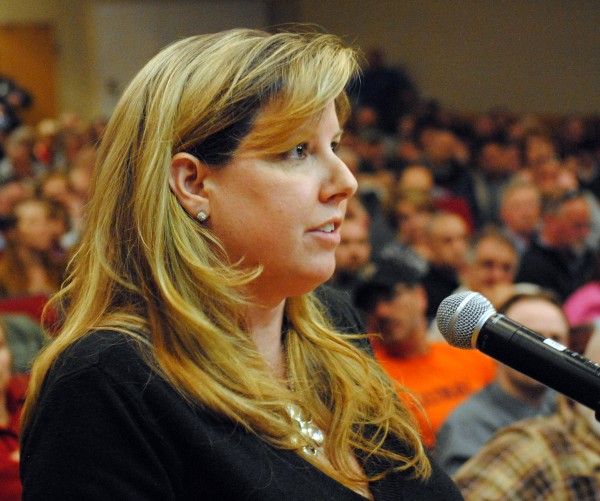

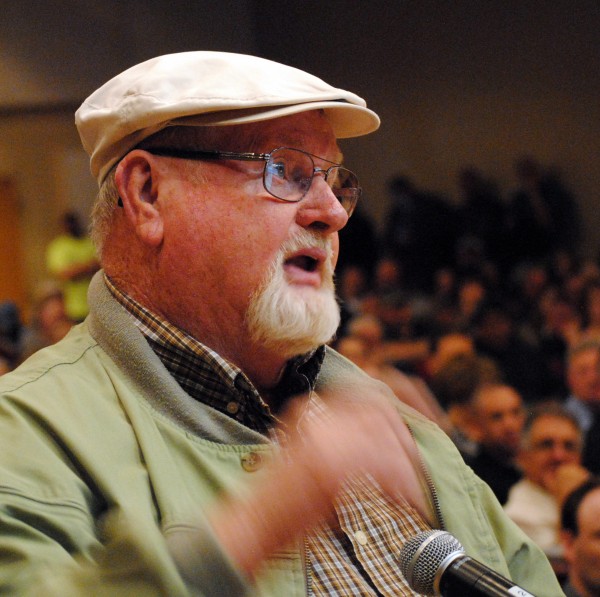
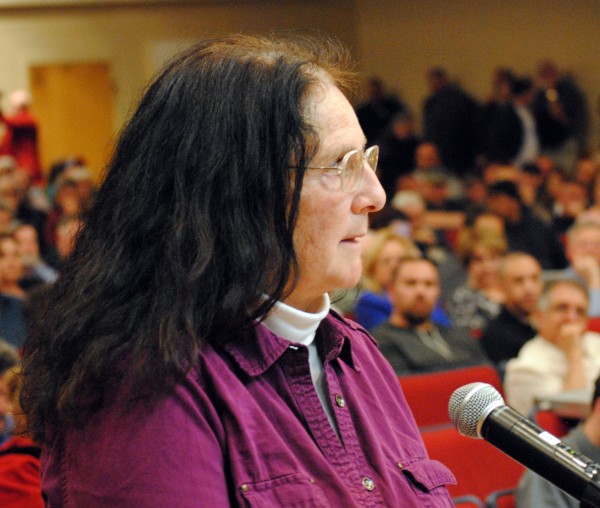
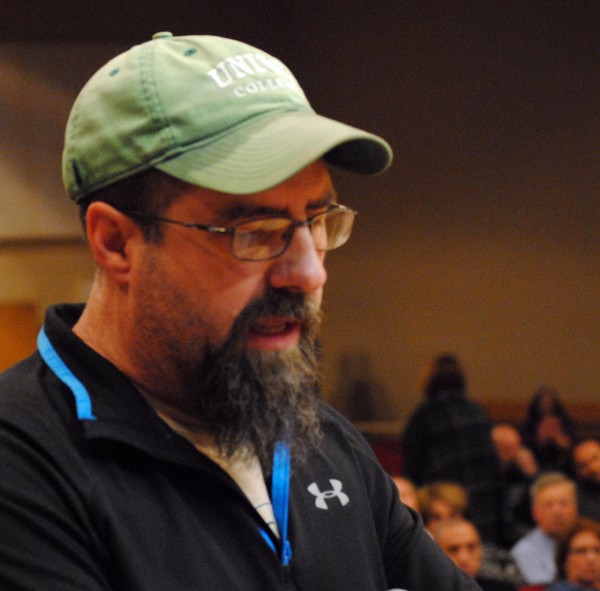
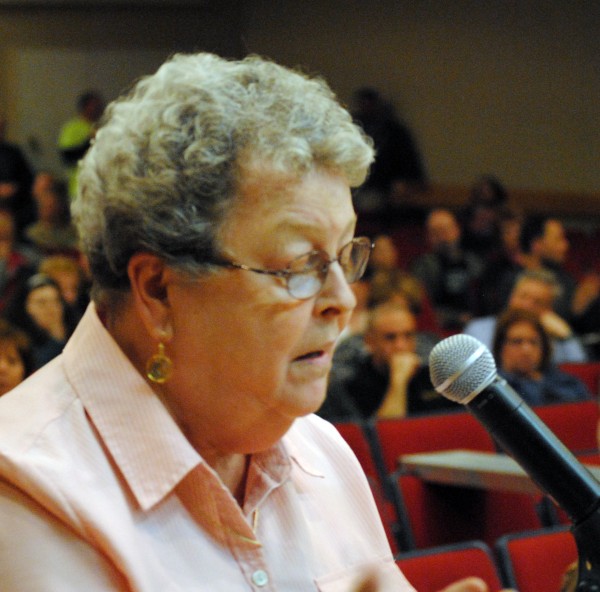
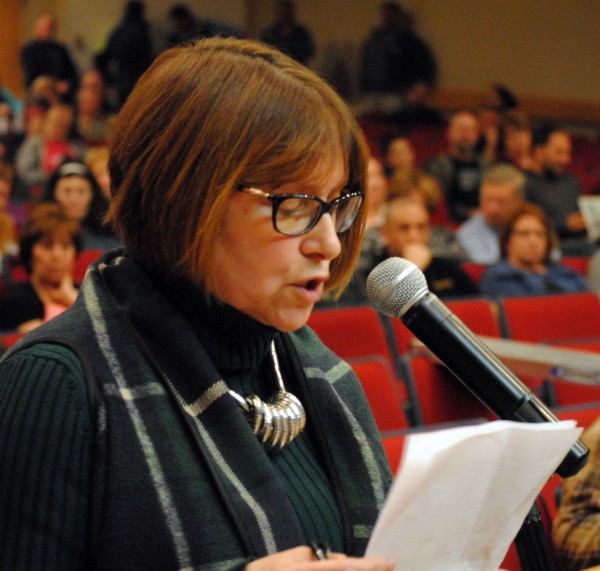
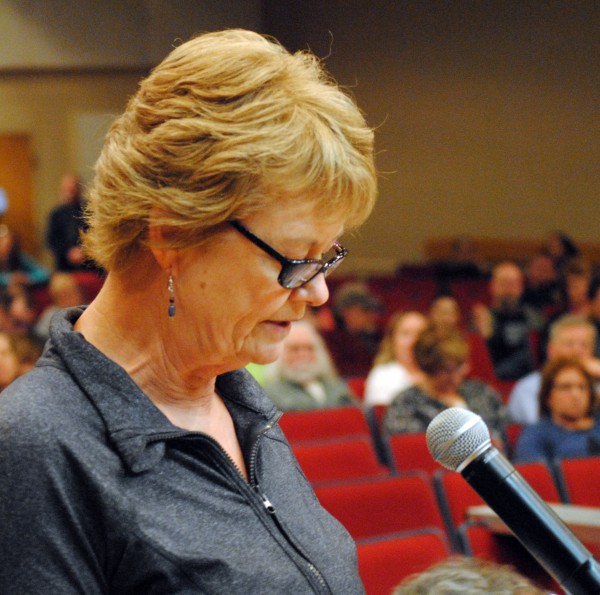
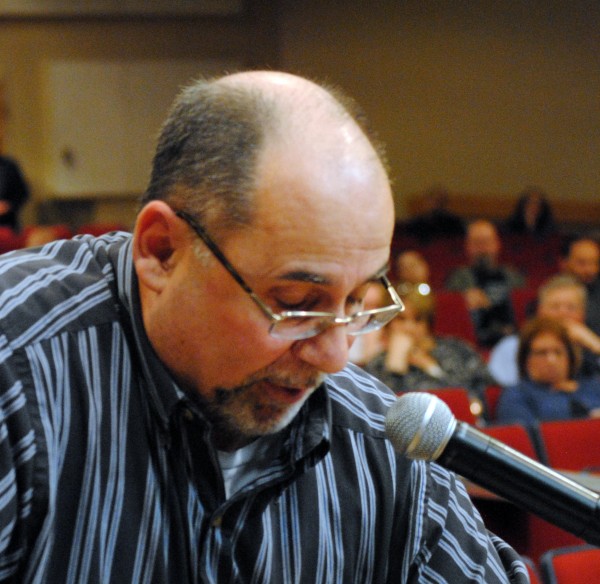
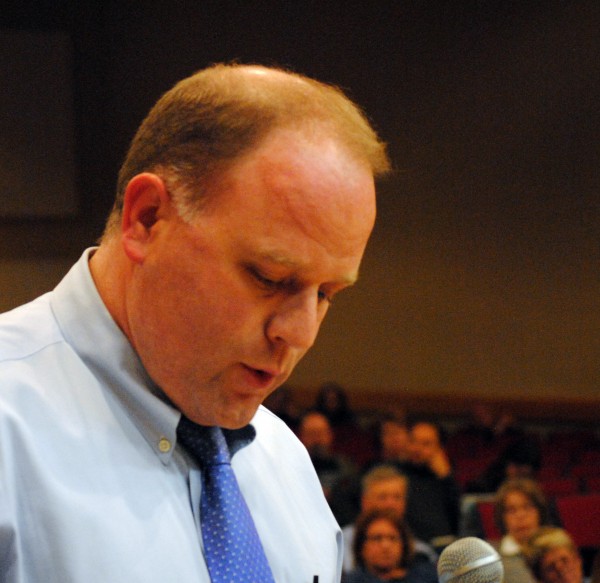
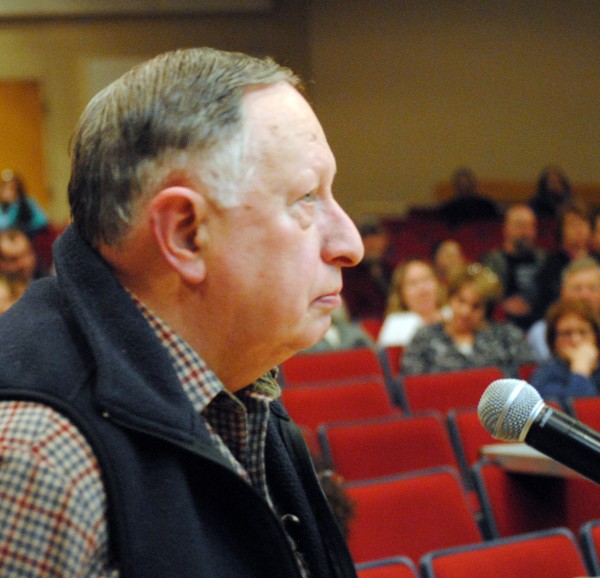
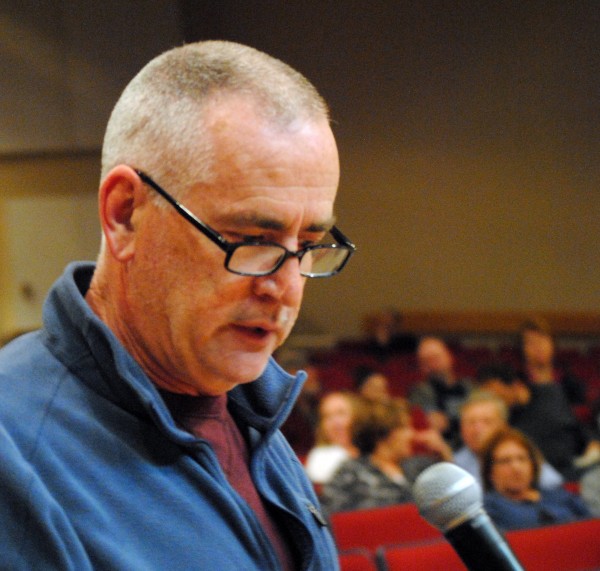

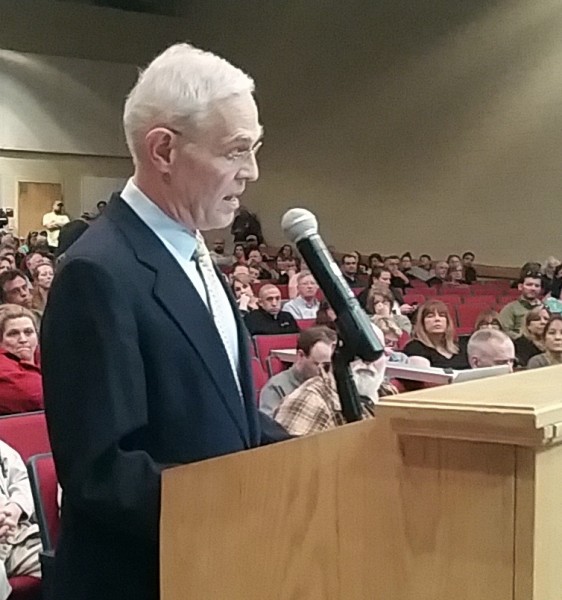
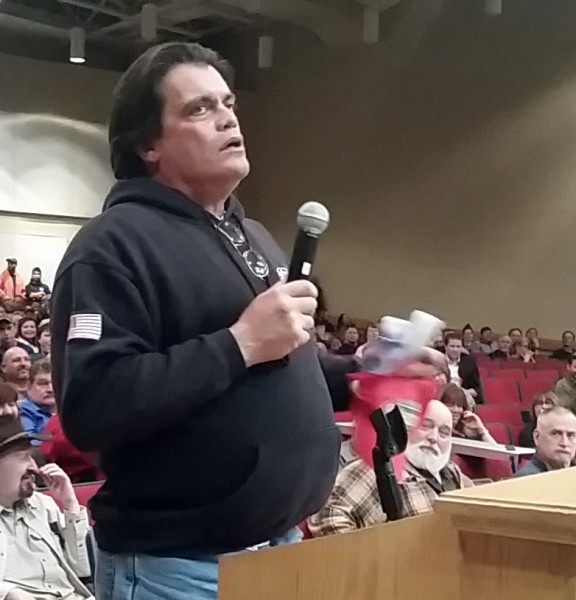
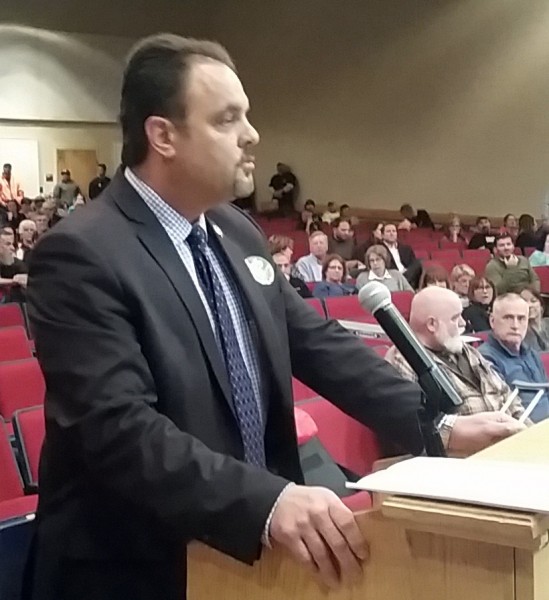
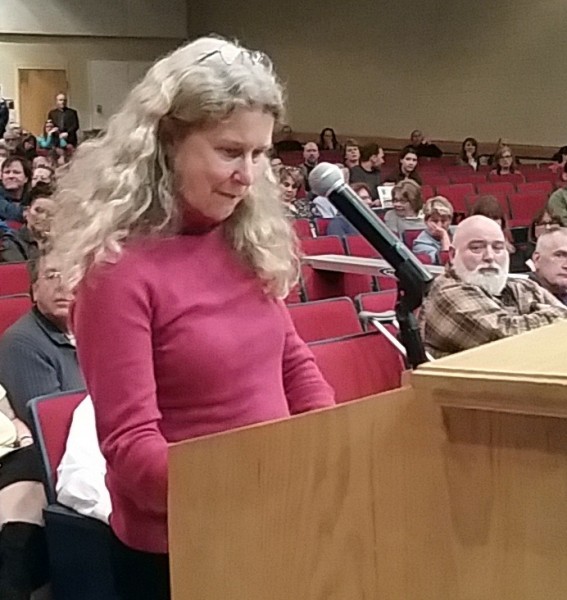
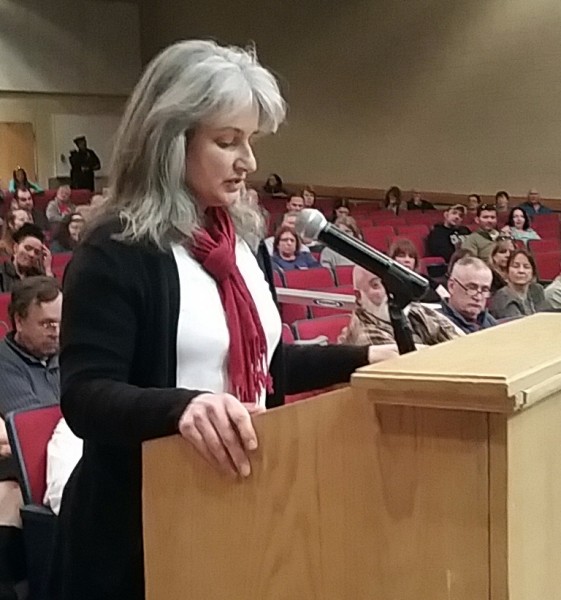
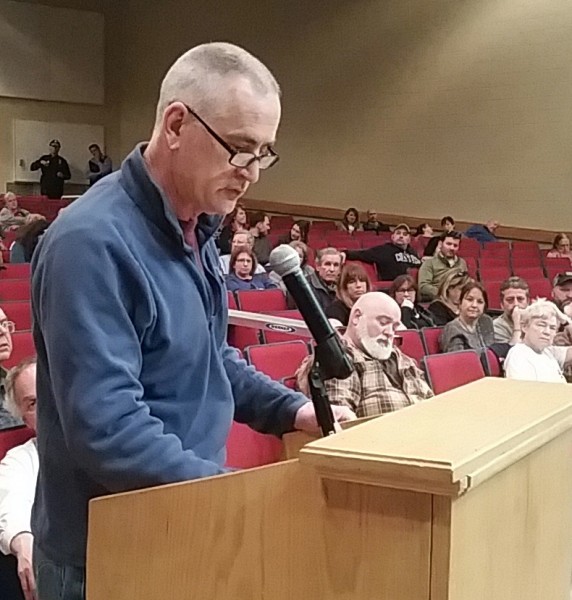
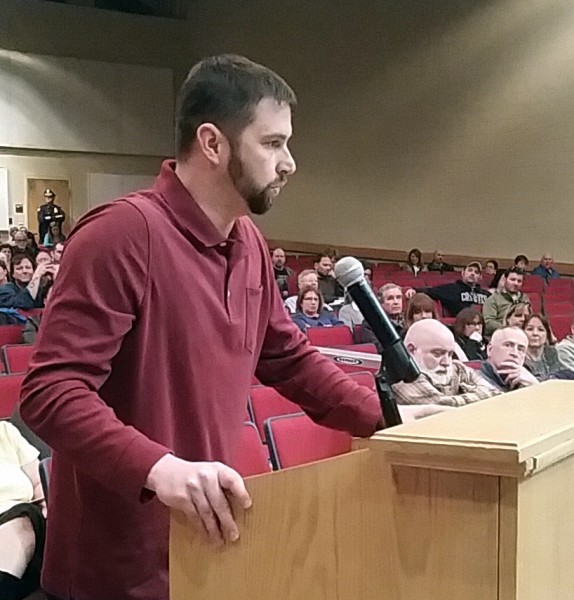
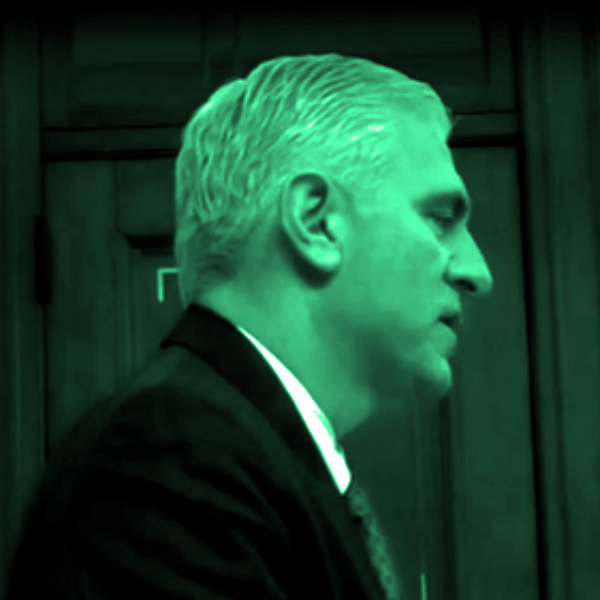
State Rep Aaron Regunberg’s bill to allow net metering and virtual net metering in Rhode Island, (House Bill No.7585) heard in House Corporations Tuesday evening, was met with an outpouring of support from business owners and conservationists. The only people who spoke against the idea were representatives for National Grid, the RI Public Utilities Commission (PUC), and the RI Office for Energy Resources (OER).
Net metering allows people to generate their own electricity- think solar panels, wind turbines, or even exercise bikes- in order to reduce their electric bills or even to sell their surplus electricity to their neighbors. Virtual Net Metering allows people to pool resources and develop solar and wind farms off their property, yet still reap the benefits of reducing or reversing the costs of electricity.
This is a big win for consumers in states like Massachusetts, where the solar rooftop industry is flourishing. During testimony, five representatives from solar companies testified in favor of the bill. They testified that the regulatory climate in Massachusetts has allowed their businesses to boom there. In Rhode Island, it is much more difficult to make the numbers work, if they can at all, because of the laws and regulations here that protect the interests of a multi-billion dollar, out of state corporations like National Grid.
Christopher Kearns, representing the RI Office of Energy Resources and the Governor’s office, said that net metering is “touched upon” in Governor Gina Raimondo’s budget and that they would prefer all net metering policy decisions be determined there.
I’ve spoken about the anti-democratic nature of inserting policy into the budget in the past. When the General Assembly prevented cities and towns from determining their own minimum wages, it was done as a budget item. When Gina Raimondo messed with abortion coverage in HealthSourceRI, it was done as a budget item. Both these decisions were disasters for poor and working class Rhode Islanders.
 I maintain that the reason to insert policy into the budget rather than through an open legislative process is to prevent public input and public discussion on vital issues and to concentrate power into the hands of a small group of legislators and the Governor’s office. As of this writing Kearns has not responded to a request for comment on this.
I maintain that the reason to insert policy into the budget rather than through an open legislative process is to prevent public input and public discussion on vital issues and to concentrate power into the hands of a small group of legislators and the Governor’s office. As of this writing Kearns has not responded to a request for comment on this.
Cynthia Wilson-Frias, Deputy Chief Counsel for the Rhode Island Public Utilities Commission, also spoke against the proposal. The PUC effectively exists to rubber stamp National Grid’s periodic rate increases. The PUC is also working with the Governor’s office and the OER on a version of net metering. She said that the bill seems over broad and might put the state at risk of violating federal laws. Of course, if Massachusetts can do this, why can’t Rhode Island?
That leads me to the last objector, Frank McMahon of National Grid. Speaking with the casual disdain of someone who knows that the power is on his side, McMahon told the room that he doesn’t want to bore us with the “technical reasons” of National Grid’s objections. McMahon agreed with the the PUC and the OER that net metering is a subject best kept within the confines of the Governor’s budget article, where, it can be presumed, his lobbying efforts will have the greatest impact.
You can watch Regunberg’s presentation of his bill and the testimony here:
You can also watch all the testimony concerning Rep Regunberg’s other bill, House Bill No.7514 in the video below. This bill, also opposed by the PUC and National Grid, would require “the division of public utilities and carriers and the public utilities commission to include climate, environmental, employment, health and consumer concerns in all their proceedings and decisions.”
Watch as Wilson-Frias of the PUC objects to the bill on the grounds that the PUC’s “primary role is to approve rates sufficient to provide a utility to engage in providing a safe, reliable service…”
In other words, climate, environmental, employment, health and consumer concerns are secondary to a utility’s ability to make a profit.
As long as that is true, effective action against climate change and towards energy independence will be impossible.
]]>According to Elmer, who made an advanced copy of his testimony available, “In June 2004, when this General Assembly enacted Rhode Island’s Renewable Energy Standard (RES)… Rhode Island was a pioneer. We were one of the first states to enact such a renewable energy mandate. The statute that this legislature enacted then was correctly seen as an experiment. The new statute obligated Rhode Island’s electricity utility to buy some of its electricity from renewable energy sources. As you know, the obligation started quite small, 3 percent of load in 2007, and it was to ramp up to 16 percent of load in 2019.”
Elmer goes on to say,
Not every statute this General Assembly enacts is successful; and not every law works as the legislature intends for it to work. But the RES Statute that you enacted in 2004 has been extremely successful; and it has worked pretty much the way you intended it to work.
“I know this to be true from first-hand experience. Since the RES was enacted in 2004, CLF has been a party in every proceeding at the Public Utilities Commission that has enforced the statute.
“When Rhode Island adopted its RES mandate in 2004, we were a true pioneer. Today, 29 states have mandatory renewable energy laws, including five of the six New England states (all except Vermont) as well as New York, Pennsylvania, Texas, Ohio, Illinois, Arizona. and New Mexico.
“Some, like California’s, are more aggressive than Rhode Island’s; but none has worked more according to plan than Rhode Island’s.
“Of course, the RES Statute you designed in 2004 ends it annual ramp-up in 2019. Thus, now is the time to extend the RES Statute until 2035. Eleven years ago, you enacted a new experimental statute; your idea was to re-visit the statute after a decade in order to determine whether or not it worked, and whether or not it was worth extending. Today. we have the answer to that question: the statute has been extremely successful. Yes, the RES should be extended.”
]]>
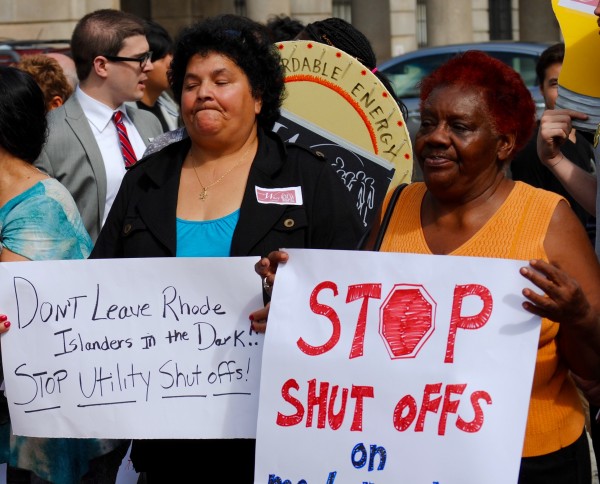 A heartbreaking video, The Lifeline Campaign, about National Grid’s seeming disregard for the law, has just been released on Vimeo. National Grid is being sued by the RI Center for Justice because they routinely shut off the electricity of seriously ill and disabled customers with past due bills, despite the presence of a doctor’s note that says the patient’s life will be imperiled if they lose service. This is against Rhode Island law.
A heartbreaking video, The Lifeline Campaign, about National Grid’s seeming disregard for the law, has just been released on Vimeo. National Grid is being sued by the RI Center for Justice because they routinely shut off the electricity of seriously ill and disabled customers with past due bills, despite the presence of a doctor’s note that says the patient’s life will be imperiled if they lose service. This is against Rhode Island law.
Worse, the RI Public Utilities Commission, charged with protecting consumers, routinely rubber stamps National Grid’s requests to terminate service and does not review each case on the merits.
There is one particularly chilling sequence in which Ramon, who has a machine that allows him to breathe, tells us about the reaction of the National Grid employee when he was confronted with the fact that Ramon might die without electricity.
“It’s my job, and National Grid ordered me to shut it off,” said the National Grid employee, “so, it’s my job to do it. I hate to do it. See, I wouldn’t like to do it because I know your life depends on it, but it’s my job and I have to do it.”
You don’t have to read Hannah Arendt to understand what’s happening here.
You can watch The Lifeline Project in its entirety, below:
I’ve covered this story here:
- National Grid sued to stop illegal utility shutoffs
- PUC protesters repelled by bureaucratic disinterest
- RIPUC adopts emergency regulations to help shut-off victims
- National Grid restores power to two dozen homes
The Lifeline Campaign is a documentary film produced by Brown University undergraduates Arohi Kapoor, Drew Williams, Isabelle DeBre, and Victoria Kidd, with the support and involvement of the George Wiley Center. The George Wiley Center is a grassroots community organization that fights for utility justice and other forms of social and economic justice through community organizing to win concrete changes in public policy. Learn more at: georgewileycenter.org.
The Rhode Island Center for Justice is a non-profit public interest law office that collaborates with the George Wiley Center to operate the Lifeline Project, a program designed to enforce and protect the rights of seriously ill and disabled low-income utility consumers in the State of Rhode Island. Learn more about the work of the Rhode Island Center for Justice at: centerforjustice.org.
 EFSB Chair Margaret Curran said that because of the “tight time schedule” it’s critical that the board get advisory opinions “as soon as possible,” raising the question as to why the board feels the need to rush Invenergy‘s application process.
EFSB Chair Margaret Curran said that because of the “tight time schedule” it’s critical that the board get advisory opinions “as soon as possible,” raising the question as to why the board feels the need to rush Invenergy‘s application process.
The EFSB also denied all but two motions that were brought before it today.
The Energy Facilities Siting Board (EFSB) met today to decide a number of issues pertaining to the “Clear River Energy Center” a new methane gas power plant planned by Invenergy for the Town of Burrillville.
Things did not go well for opponents of the plan.
Curran began the meeting reminding those in attendance that their would be no public comment. This did not stop people from standing and loudly declaring their dissatisfaction with some decisions made by the board.
EFSB board member Janet Coit, director of the Department of Environmental Management (DEM), asked that people “respect the process” and stressed that there would be ample opportunity for public comment. Then the board began making their decisions.
Dennis and Kathryn Sherman and Paul and Mary Bolduc whose properties are near the site of the proposed plant and whose interests are not covered by any other intervenors, were granted intervenor status by the EFSB.
The Rhode Island Progressive Democrats (RIPDA) were denied. They do not have an adequately expressed interest.
Fighting Against Natural Gas (FANG) and Burrillville Against Spectra Expansion (BASE) are also denied, their intervention was decided to be not in the public interest.The simple allegation “however heart felt” of public interest is not enough.
Fossil Free Rhode Island (FFRI), Sister Mary Pendergast and Occupy Providence filed identical applications, and there is no reason to grant intervenor status said Curran and Coit.
Peter Nightingale, from Fossil Free RI, issued the following statement upon the group being denied intervenor status:
“Rhode Island government may decide to sell Rhode Island down the “Clear River.”
- “If it does, it may have acted in accordance with twisted statuary law.
- “But government, in that case, will have failed in its fiduciary duty to protect the natural resources —air, land and water— it holds in trust for the People.
- “When the time comes, those responsible will be held accountable for their crimes against humanity and nature.”
Nightingale was escorted from the room by security when he rose and loudly read his statement to the board.
Pat Fontes, representing Occupy Providence, also rose and spoke, as she left the room. Fontes said, in a statement, “The predator’s pursuit of profit produces pain for poorer people. It’s the weakest who inherit the consequences without ever having their opinion about the risks taken into account.” She said, “Remember Flint, Michigan!” as she left.
Sally J. Mendzela‘s motion was dismissed because her ideas were “outside the scope” of the process.
The Burrillville Land Trust‘s motion for intervention was denied. Their concerns will be dealt with by the DEM, said the board. “I think their will be other opportunities” said Coit, for the Burrillville Land Trust to make their concerns known. The Land Trust’s motion to close the docket was rendered moot by their denial of intervenor status.
Paul Roselli, president of the Burrillville Land Trust was not surprised by the Board’s decision. He maintains that the issue of biodiversity will not be covered. The impact on species is dependent on an individual species’ status as endangered or threatened, etc. The overall or “holistic” impact of something like Clear River is not considered, and this is the perspective Roselli hoped the Land Trust would bring.
Still, some good came out of the Land Trust’s motion. Invenergy’s application has been updated to ensure compliance with section 44 of the Clean Water Act.
RI Administration for Planning, Office of Energy Resources, the DEM, the RIPUC, RIDOT, the Department of Health and other state agencies will all be asked for advisory opinions. Curran says that because of the “tight time schedule” it’s critical that we get advisory opinions “as soon as possible.”
This raises the question: Why is the EFSB on a Invenergy’s time table?
The Office of Energy Resources will render advisory opinions regarding all issues per the Resilient RI Act. as bought up by the Conservation Law Foundation (CLF).
The board will be looking for specific limitations on the use of “secondary fuels,” said Curran. The proposed power plant is made to run on fuel oil as well as methane, as discussed on RI Future here.
There was also some consideration given to Obama’s Clean Power Plan.
The EFSB is chaired by RI Public Utilities Commission (RIPUC) Chairperson Margaret Curran and has only one other sitting member, Janet Coit, director of the Department of Environmental Management (DEM). The third position on the board is usually filled by the associate director of the RI Administration for Planning, a position currently unfilled.
The first public hearing will be on Thursday, March 31 in the cafeteria of the Burrillville’s High School. The meeting will be officially announced soon.

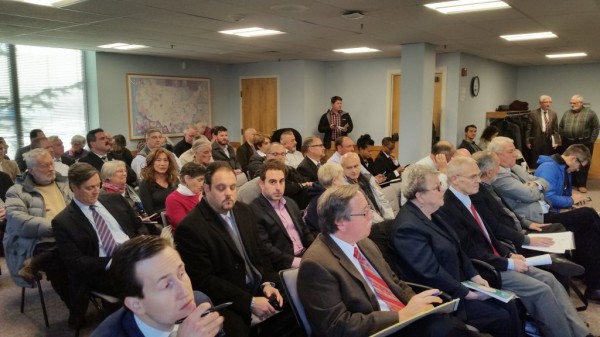 The new methane gas power plant planned by Invenergy for the Town of Burrillville met strong opposition from a variety of environmental groups but also had what seemed like strong support from both members of the Energy Facilities Siting Board (EFSB) which will ultimately approve or deny the application. The EFSB is chaired by RI Public Utilities Commission (RIPUC) Chairperson Margaret Curran and has only one other sitting member, Janet Coit, director of the Department of Environmental Management (DEM). The third position on the board is usually filled by the associate director of the RI Administration for Planning, a position currently unfilled, but it is expected that Governor Gina Raimondo will choose someone to fill that role soon.
The new methane gas power plant planned by Invenergy for the Town of Burrillville met strong opposition from a variety of environmental groups but also had what seemed like strong support from both members of the Energy Facilities Siting Board (EFSB) which will ultimately approve or deny the application. The EFSB is chaired by RI Public Utilities Commission (RIPUC) Chairperson Margaret Curran and has only one other sitting member, Janet Coit, director of the Department of Environmental Management (DEM). The third position on the board is usually filled by the associate director of the RI Administration for Planning, a position currently unfilled, but it is expected that Governor Gina Raimondo will choose someone to fill that role soon.
As the standing room only hearing got under way, Chairperson Curran noted that there hasn’t been a hearing like this since 1999, the last time an energy project of this size was considered. No public comment was allowed at this meeting, but Curran said that there were three public comment meetings scheduled. (It turns out they have not been scheduled at the time of this writing.)
Board member Coit spent some time near the beginning of the hearing informing the room that her position as head of the DEM will not impact her decisions as an EFSB board member. The duties of the DEM in deciding on key aspects of Invenergy’s proposed power plant have been delegated to her assistant, Terry Gray, and Coit says she is firewalling herself from her department’s work in this area. Some activists in the room expressed doubt in the possibility of such a firewall. It should be noted that Governor Gina Raimondo nominates all three EFSB board positions and that she has publicly backed Invenergy’s plan.
The two member board’s first order of business was to deal with an unprecedented number of motions for intervention, which if granted, would allow standing in these hearings for several groups and individuals. Invenergy objected to many of the motions, but did not object to allowing intervenor status for the Conservation Law Foundation (CLF), the Burrillville Land Trust (BLT), The RI Department of Energy Resources, the RI Building Trades Council and National Grid. The board granted all but the Burrillville Land Trust intervenor status, and said that the decisions on the rest of the motions for intervention would be announced at a January 29 meeting.
One motion immediately granted to Invenergy allowed the company to keep certain “proprietary” financial information secret from the public. Between this and Invenergy’s eagerness to deny intervenor status, it becomes difficult to believe the company is truly committed to an open, public process.
I covered Invenergy’s objections to granting intervene status here. Since then the Building Trades filed for last minute intervenor status because their union would represent the vast majority of workers who will build the plant if approved. The Building Trades were granted limited intervenor status pertaining to employment.
Both the Conservation Law Foundation and the Burrillville Land Trust had motions before the board asking that Invenergy’s application be denied. BLT said bluntly that the Invenergy application contains erroneous information or deliberate omissions. There are, says BLT, no biodiversity impacts and no noise impacts cited in Invenergy’s application. BLT maintains that Invenergy underestimated the impact of their power plant on species diversity by half. The effects on birds and bats, so important to keep insect populations down, is likely to be severe. Invenergy’s estimated water impacts are 75% less than what BLT expects. Ultimately, says the BLT, the impact of this power plant will be felt for decades after its estimated 40-50 life span.
The CLF’s motion to dismiss was based in part on the Resilient Rhode Island Act, and on the fact that Invenergy’s application is incomplete. Under the law, says CLF attorney Jerry Elmer, “Incomplete applications must be rejected.”
Invenergy could not argue that their application was complete. They even admitted that they are still in negotiation for some permits. But Invenergy maintained that this is business as usual and not a reason to reject the application. Invenergy is pushing hard on this application, and want the EFSB to make a quick decision because if this application process drags on too long, they could be out hundreds of millions of dollars, said the CLF. But Attorney Elmer said that Invernergy needs to live with their business decisions, and the EFSB must deny incomplete objections even if Invenergy might face a monetary loss.
Chairperson Curran argued for Invenergy’s position, it seems to me, better than Invenergy’s own lawyers. Curran said that she thinks incomplete applications can move ahead despite what the CLF sees as important, material omissions. The application, says Curran, will be finished by the time the EFSB makes a decision, but Attorney Elmer countered that the statute and rules say that the application must be complete when filed, not when decided upon.
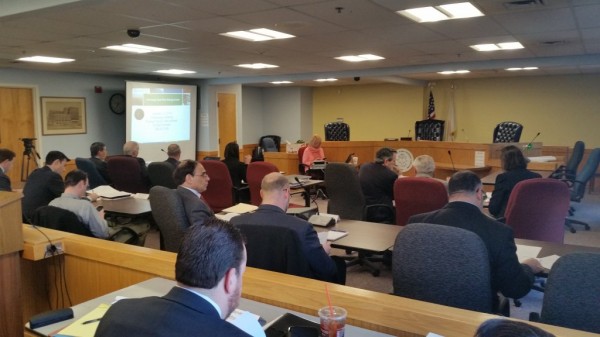
Board member Coit also argued passionately for Invenergy’s position. If Curran and Coit want to obey the law though, it would seem that they might have to reject Invenergy’s application, something they clearly didn’t want to do.
Invenergy’s lawyers were clearly pleased with Curran and Coit’s defense of their application. They assured the EFSB board that the board will have plenty of information about the power plant by the time they make their decision. The lawyers maintained that what isn’t in the application isn’t important. In fact, in all their years of practice, these lawyers say they have, “never seen such a detailed application.”
The CLF was next questioned about their reliance on the Resilient RI Act. Under the law, all state agencies shall follow this act. This means that the act applies to the EFSB and that the EFSB has the discretion to consider the climate change impact of the proposed energy plant.
Invenergy seems to feel that the Resilient RI Act is a toothless reminder about the importance of greenhouse gas reductions. They said that the act says nothing about their project and really doesn’t apply.
The second half of the hearing consisted of Invenergy’s sales pitch, a 51 page PowerPoint presentation that is both an ad for Invenergy (including slides touting the companies wind and solar projects, projects they seem to have no interest in bringing to Rhode Island) and plenty of information about the robustness of the company’s finances.
]]>